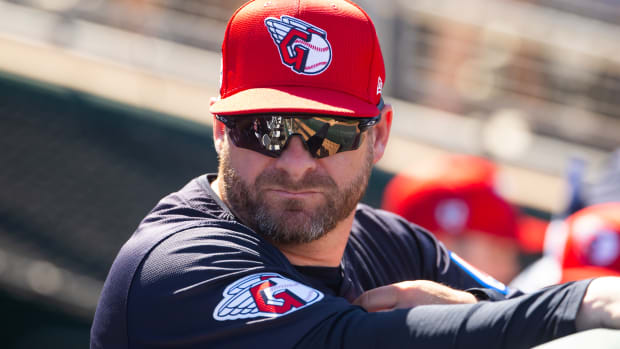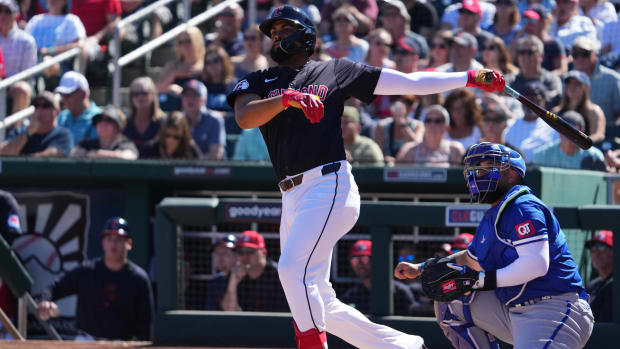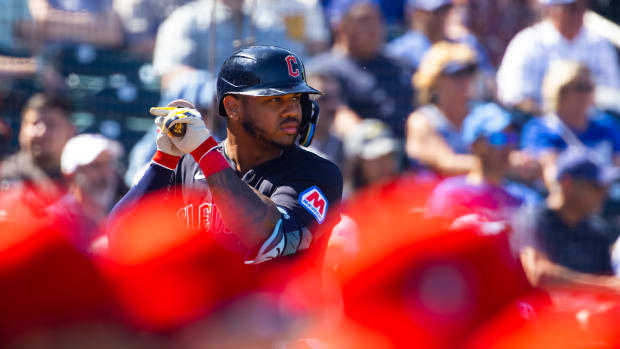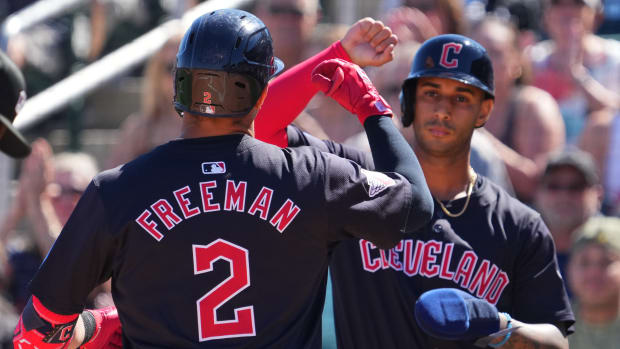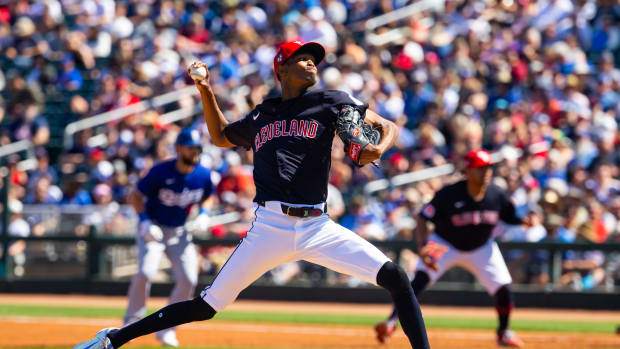Indians Lookback: Albert Belle's Final Heroic Act Before Becoming a Cleveland Villain
Long before a certain "kid" from Akron took his talents to South Beach and jeers rained from the rafters, creating a wall of sound that could rival the speaker output at a Metallica concert during his return, there was a different sort of Cleveland homecoming. This one didn't feature a comic sans-themed letter or an eventual reconciliation that led to a parade for the ages, but boos did fill the air, displaced only by the Monopoly money that floated its way to the Jacobs Field turf.
You see, after several years of their fearsome slugger tormenting everyone else, it was Tribe fans' turn to experience animosity. And voice animosity, they did.
Albert Belle became Cleveland's villain.
But prior to Belle's return as a member of the White Sox in June of 1997 -- he signed, what seemed zany at the time, a five-year, $55 million free-agent deal with Chicago -- the right-handed hitter gave Tribe fans a much different set of emotions. He lived in the nightmares of pitchers, flexed his muscles in response to corked bat allegations from other clubs, made Jason Grimsley perform his best Mission Impossible impersonation and dropped WWE-style forearms on any second baseman that got in his way, all to the joy of the City of Cleveland.
And Belle's final heroic act as a member of the Indians became one of the most memorable moments of his career, all despite a series outcome against the Orioles in the 1996 ALDS that left a far worse taste than falling short of a title in 1995. It also came a year after Belle slugged 50 homers, 52 doubles and probably should have been the league MVP, not Boston's Mo Vaughn.
Belle's monstrous grand slam in Game 3 of the best-of-five playoff kept the Indians alive in the series, a set Cleveland would drop in Game 4. Despite that reality, his missile to the Jacobs Field bleachers still provides warm feelings, perhaps because it was Belle's last hurrah as a member of the Indians, or maybe because, in that moment, it felt as if Jacobs Field magic could trump an 0-2 deficit.
Perhaps, with some reflection, we can unpack why it's still memorable.
The moment itself was set up by events that extend beyond the inning that preceded it. Things can be traced as far back as MLB's head-scratching rules at the time, forcing the 99-win Indians, the best team in the AL, to play the Wild Card-winning Orioles in Baltimore for the first two games of the series.
The O's used whatever advantage that created to sweep the first two games at Camden Yards. Cleveland was blown out in the first game, 10-4, and missed several chances to break out in the late innings of Game 2, falling 7-4.
The Indians and Orioles were also connected by more than just their first-round matchup. Cleveland turned over part of their roster during the 1996 season, attempting to recreate the sort of fuzzy feelings the 1995 campaign provided. Part of that purge, which included a trade of fan favorite Carlos Baerga to the Mets for Jose Vizcaino and Jeff Kent, involved the deal of Eddie Murray back to Baltimore for left-handed pitcher Kent Mercker.
Mercker logged fewer than 12 innings for the Tribe in the regular season, but Murray managed to go 6-for-15 against his former team, perhaps fueled by the FTF (former team factor), which, undeniably, seems to add 100 points of OPS to any showdown between former mates.
Then, of course, there was the specter of Belle's looming free agency. It certainly wasn't a forgone conclusion that the outfielder would cash in elsewhere, but with the core of players that really burst onto the scene in 1994 starting to break apart, it was clear that Cleveland was in store for even more transition.
But that wasn't on the minds of Tribe fans in Game 3. The only goal: Stay alive.
The Indians held an early 3-1 lead on Mike Mussina, punctuated by a home run from Manny Ramirez in the second inning. But Jack McDowell surrendered that lead, serving up a three-run homer to B.J. Surhoff -- one that Kenny Lofton couldn't track down this time -- which put the O's up by one in the fourth.
Cleveland would bring things back to even in the bottom of the inning, 4-4, on a Kevin Seitzer RBI single. That's where things would remain.
Mussina retired the last seven he faced, including four on strikeouts, but Baltimore manager Davey Johnson opted to go to his bullpen for the eighth. The bottom half of the inning began with back-to-back walks by the ageless Jesse Orosco, one to Lofton and another to Seitzer. That is where things got wild.
With Jim Thome, a left-handed hitter set to hit, manager Mike Hargrove called for a pinch-hitter. And who replaced the future Hall-of-Famer, the eventual franchise leader in homers at the plate? None other than utility infielder Casey Candaele.
Now that you've spit your coffee all over your phone or computer, feel free to clean the screen and note that Candaele entered the series with a career .639 OPS.
What prompted the move? Well, Orosco was a lefty, duh.
This wasn't the first or last time Thome would be deemed unworthy of facing a southpaw. Forget that the left-handed hitter could easily change the course of any game with a single swing (or that he had just completed one of the best seasons from a third baseman in Indians history), Candaele was up in his place.
And he was up there to bunt.
... Feel free to spew again.
"I told Jim to sit down and I'd take care of it," Candaele jokingly told reporters.
Even if Candaele had been successful, it would have likely led to the Orioles walking Belle. A bases-loaded situation for Julio Franco with one out is still appealing -- wait, Franco was hitting ahead of Ramirez?! -- but it's certainly not the Belle at-bat to which we'd soon be treated.
Somehow, the baseball gods looked past this blatant attempt to waste a scoring opportunity, and Candaele, through divine intervention, worked the third walk.
That set the stage for Belle.
His face indicated he had no interest in playing for one run.
The Orioles went to one of their heroes from Game 2, Armando Benitez. As the ESPN broadcast and play-by-play voice Jon Miller explained, Benitez came on to face Belle in the game prior, walking the slugger and allowing a bases-loaded sacrifice fly to Franco to tie the game. But the hard-throwing 23-year-old would then get Ramirez to strike out and Sandy Alomar Jr. to fly out, preventing a big inning and later allowing the Orioles offense to take the lead.
"[He's] in an even tighter spot in Game 3," the soothing tones of Miller noted.
Bases loaded. Nobody out. Tie game. Facing Belle.
No doubt.
Of course, Benitez's connection to the Indians would later be cemented. He would work two innings and earn the all-important relief win in Game 4 to send Baltimore to the ALCS against the Yankees. More important for Tribe fans, he was the man on the mound when Tony Fernandez connected on the solo homer in Game 6 of the 1997 ALCS, which ultimately sent Cleveland back to the World Series.
With Belle taking some intimidating cuts outside of the box, ESPN noted that Albert Belle owned a .375 career average with seven grand slams entering the at-bat.
Excellent foreshadowing.
The broadcast then flashed its way around the infield.
Lofton at third ...
Seitzer at second ...
Candaele, fresh off the best bunt that he never laid down, at first.
"We've got the right man in that position," Lofton would tell reporters of Belle's upcoming matchup against Benitez.
The showdown began in style, as Belle fouled back a 98 mph heater. The cut was so ferocious, Belle nearly lost his balance on the follow-through.
Benitez, unaffected by Belle's terrifying swing on the first pitch, loaded up another fastball and got the right-handed hitter to foul tip a 96 mph four-seamer into the catcher's glove for the second strike.
The O's were one pitch away from making this a manageable situation.
With both competitors gearing up for the next chapter in this battle, the broadcast mentioned that the Orioles were playing for two outs on the infield, interested in trading a pair of outs for a run. The Indians' cleanup man had grounded into 20 double plays in 1996 -- he was one year away from leading baseball in double plays -- but Benitez's primary goal here was to retire Belle on strikes.
Benitez then shook off a pair of signs before settling on one he preferred.
The third pitch was elevated up and out of the zone -- the location is worth filing away for later -- but Belle fouled back another offering. ESPN's radar gun said "72." Miller quipped, "Well that was not 72 miles per hour, I'll tell you that." The broadcast team joked that the pitch was so fast, it caused their equipment to malfunction.
Belle's batting gloves were also in need of adjustment, as he took an opportunity to pull the velcro as tight as the spot Benitez was trying to escape.
The fourth offering was the first ball of the at-bat, a pitch that registered 89 on the radar gun. The toss remained up and out of the zone. The count was 1-2.
Fans remained on their feet.
Benitez climbed up on the hill, then stepped off the rubber. Belle, not to be outdone, strolled outside of the batter's box and took some practice hacks. This visibly annoyed the hurler. Belle climbed back in the box, then Benitez side-stepped the mound. He collected his thoughts, took a breath and re-toed the slab.
It was Belle that would soon prove the winner of this battle of wits.
Benitez tossed the fifth pitch of the exchange, another elevated fastball. This one, however, wasn't drifting to the other batter's box, it stayed on the outside corner. Belle swung. Connected. This time, it was headed for fans in the other direction.
Belle posed and examined his work. He let the bat drop gently at his left side.
"There's a long drive!" Miller shouted, his voice elevated nearly as high as the pitch. The level of his call nearly distorted the audio for a brief moment, but his loud howls were the only way his voice could be heard over the roar of the crowd.
Having found Belle's barrel, the fly ball traveled toward the left-field bleachers, clearly ticketed for a spot above the 19-foot wall. The deep drive disappeared into a sea of delirious bodies. People fell over each other while fighting over the souvenir like a frenzy of hungry sharks in the presence of their next meal.
"Grand slam for Albert Belle!" Miller screamed. The next minute of broadcast audio would be filled only by a continuous buzz from the sell-out crowd.
Benitez stared at the scene like a man who just backed his car into a telephone pole.
Indians players spilled out of the dugout to greet the quartet of runs that had just crossed the plate, as Belle's slam gave the Indians an 8-4 lead. Johnson looked on from the Orioles dugout in some combination of disgust and disbelief, perhaps thinking of ways to undo the removal of Mussina to begin the frame.
Fans remained standing as the celebration continued. Belle would eventually return onto the field, raising his arms in the air to only further ignite the cheers.
In that moment, there was plenty of joy in this particular Mudville -- mighty Albert had treated that baseball like a clubhouse thermostat. The Indians were alive in the series and, almost instantly, the magnitude of the blast could be felt.
Postseason included, its was the 248th homer of Belle's Cleveland career. It would also be his last.
The Indians would go on to win, 9-4, ensuring that a Game 4 would take place. Needing another win to force a Game 5, Cleveland would even hold a one-run lead entering the ninth. But closer Jose Mesa would allow a game-tying single to Roberto Alomar in the ninth and would eventually yield the go-ahead homer to Alomar in the top of the 12th to push Baltimore to the series win.
Belle's moment, one of the biggest postseason homers ever hit in Cleveland, came in an eventual series-losing effort. It also serves as proof that, on occasion, moments can exist independent of their outcomes.
Of course, the Tribe would get their payback a year later, when Cleveland upset the Orioles in the 1997 ALCS, this time with Mesa retiring Alomar for the final out to send the Indians to their showdown with the Marlins. However, that season would come after Belle's departure to Cleveland's division rival, a heel turn in the eyes of Indians fans that led to boo-infused hostility and resentment.
But years later, the memory of Belle's final heroic act with the Indians still holds value, far more than the fake money that would litter the field just one year later.








